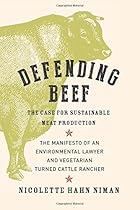Defending Beef: The Case for Sustainable Meat Production

| Author | : | |
| Rating | : | 4.56 (718 Votes) |
| Asin | : | 1603585362 |
| Format Type | : | paperback |
| Number of Pages | : | 288 Pages |
| Publish Date | : | 2013-12-10 |
| Language | : | English |
DESCRIPTION:
Cattleand common sensehave found their champion.”--Judith D. Far from being a bogeyman of climate change and other environmental concerns, she argues, cattle, when properly managed, can play an important role in local food systems, land health, and carbon sequestration. The main ecological question that haunts grass-fed beef involves climate change. Citing loads of research, she argues that enteric emissions (methane from burps) are likely overstated and can be curtailed by breeding and techniques like abundant salt licks, and more than offset by the carbon-gulping capacity of intensive grazing (where farmers run
Four Stars MCONN009 Book makes sense along the lines of the Allan Savory grazing methods. "Mother (Earth) Knows BestThe Case for Cattle" according to Dorothy Coakley. Ten years have passed since my mother went to what had to be "her heavenly reward." At least that was her personal goal: cooking dinner every Sunday for a family, educating her children in the ways of her midwestern German ancestors. "Use it up, wear it out, make it do, or go without" she would tell all of us. So, with the exception of Thanksgiving (turkey) and Easter (lamb). Defending Beef: Nicolette Hahn Niman's Call for a Third Way Because I am at once a writer, a cook, and an omnivore, I have been confronted many times by a zealous band of culinary evangelists know as vegans, and their somewhat less-strident cousins, the vegetarians. Let me say at the outset that I begrudge them nothing, despite having been repeatedly labeled "unethical," "stupid," "uncaring," and "Satan-spawn" (really) because of the
In fact, properly managed livestock play an essential role in maintaining grassland ecosystems by functioning as surrogates for herds of wild ruminants that once covered the globe. Hahn Niman argues that dispersed, grass-fed, small-scale farms can and should become the basis for American food production, replacing the factory farms that harm animals and the environment.The authora longtime vegetariangoes on to dispel popular myths about how eating beef is bad for our bodies. For decades it has been nearly universal dogma among environmentalists and health advocates that cattle and beef are public enemy number one.But is the matter really so clear cut? Hardly, argues environmental lawyer turned rancher Nicolette Hahn Niman in her new book, Defending Beef.The public has long been led to believe that livestock, especially cattle, erode soils, pollute air and water, damage riparian areas, and decimate wildlife populations.In Defending Beef, Hahn Niman argues that cattle are not inherently bad for either the Earth or our own nutritional health. She methodically evaluates health claims made against beef, demonstrating that such claims have proven false. She shows how foods from cattlemilk and meat, particularly when raised entirely on grassare healthful, extremely nutritious, and an irrepla
She lives on a ranch in Northern California, with her husband, Bill Niman, and their two sons.. In recent years she has gained a national reputation as an advocate for sustainable food production and improved farm-animal welfare. She is the author of Righteous Porkchop (HarperCollins, 2009) and has written for numero
